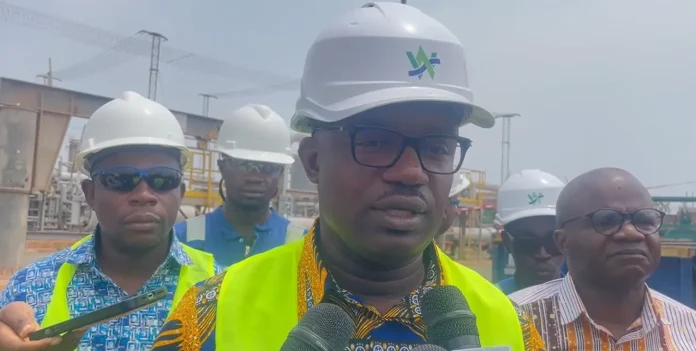The Minister for Energy and Green Transition, John Abdulai Jinapor, has commissioned the expansion of rural electrification to 13 new communities in the Central Gonja District of the Savanna Region on Saturday, October 11, 2025. The commissioning represents a significant milestone in the government’s broader strategy to achieve universal electricity coverage across Ghana.
The beneficiary communities include Zomlampe, Nikpegu, Torope, Dokope, Kpatinyan, Darivogupe, Bagpe, Dawunipe, Diwurupe, Larigbani, Kusawgupe, Gbonayili, and Tuluwe. These communities join the growing number of rural areas connected to the national grid under the government’s accelerated rural electrification program championed by President John Dramani Mahama.
During the commissioning ceremony, Minister Jinapor highlighted Ghana’s achievement of approximately 90 percent electricity access, describing it as one of the highest rates on the African continent. He reaffirmed the government’s determination to achieve universal coverage, stating that no community should remain without power.
“No community should be left in the dark,” Jinapor said, emphasizing that extending power to rural areas would improve livelihoods, enhance educational opportunities, and support small-scale enterprises that form the backbone of rural economies.
While celebrating the government’s continued investment in electrification infrastructure, the Minister urged citizens to fulfill their civic duty by paying for the electricity they consume. He stressed that sustainable power provision depends on a shared responsibility between government investment and citizen contribution.
“Government is doing its part by expanding electricity access, but we must all play our roles as citizens by paying for the electricity consumed,” Jinapor emphasized. “If more people pay, that’s how we keep the power on. It’s a shared responsibility.”
Addressing concerns raised by residents in Tamale about electricity bills, the Minister called for fairness and dialogue. He noted that those facing genuine financial difficulties could be placed on payment plans to help them manage their obligations without losing access to power.
However, Jinapor issued a stern warning against illegal power connections, describing them as destructive to transformers and detrimental to entire communities. Illegal connections not only pose safety hazards but also contribute to technical and commercial losses that undermine the sustainability of the power sector.
The Energy Minister also highlighted the implementation of a Loss Reduction Programme, which has already yielded approximately 10 percent improvement in collections while reducing technical and commercial losses. This program represents part of broader reforms aimed at stabilizing Ghana’s power sector and ensuring financial sustainability.
“As Energy Minister, I will continue to provide every support to ensure this progress continues,” Jinapor affirmed, signaling ongoing commitment to both infrastructure expansion and operational efficiency improvements.
Between January and June 2025, 63 new communities were connected to the national grid under the accelerated rural electrification program, demonstrating the government’s sustained pace of implementation. The Central Gonja commissioning adds 13 more communities to this growing list, bringing electricity access to thousands of residents who previously relied on alternative energy sources.
The expansion of rural electrification aligns with the government’s 24-Hour Economy agenda, which requires reliable electricity supply to support businesses operating extended hours and creating employment opportunities across the country. Access to electricity enables productive activities beyond daylight hours, transforming economic possibilities for rural communities.
For the Central Gonja communities, electricity access opens doors to multiple development opportunities. Students can study after dark, health facilities can operate more effectively, small businesses can extend their operating hours, and households gain access to modern conveniences that improve quality of life.
The rural electrification program also supports agricultural transformation by enabling mechanization, cold storage facilities for produce preservation, and agro-processing activities that add value to farm products. These capabilities help rural farmers access better markets and improve their incomes.
Ghana’s electricity sector has undergone significant reforms under the current administration, with the Ministry of Energy and Green Transition focusing on both technical and financial challenges. The stabilization efforts have included addressing capacity charges, improving revenue collection, and reducing losses across the distribution network.
The government’s commitment to universal electricity access reflects recognition that energy poverty remains a barrier to inclusive development. Rural communities without electricity often face disadvantages in education, healthcare, economic opportunities, and overall quality of life compared to their urban counterparts.
As Ghana continues advancing toward its universal electrification goal, the success depends not only on infrastructure investment but also on building a culture of payment compliance that ensures financial sustainability. The Minister’s emphasis on shared responsibility acknowledges this reality while offering flexible solutions for those facing genuine hardship.
The Central Gonja commissioning demonstrates practical implementation of national electrification policies at the community level, translating government commitments into tangible improvements in people’s lives. The 13 communities now join Ghana’s electrified areas, positioning them to participate more fully in the nation’s economic and social development.
Source: newsghana.com.gh











